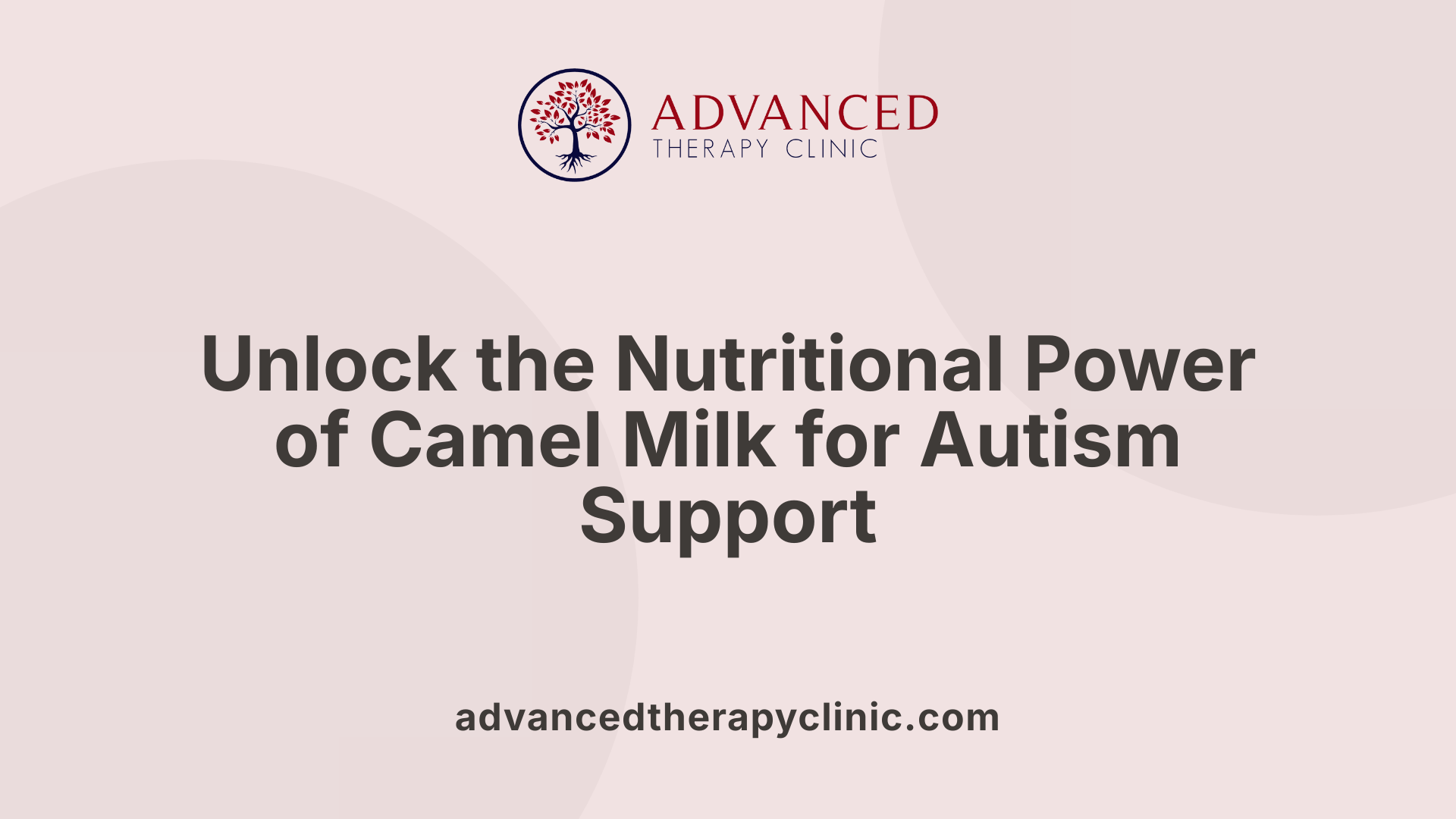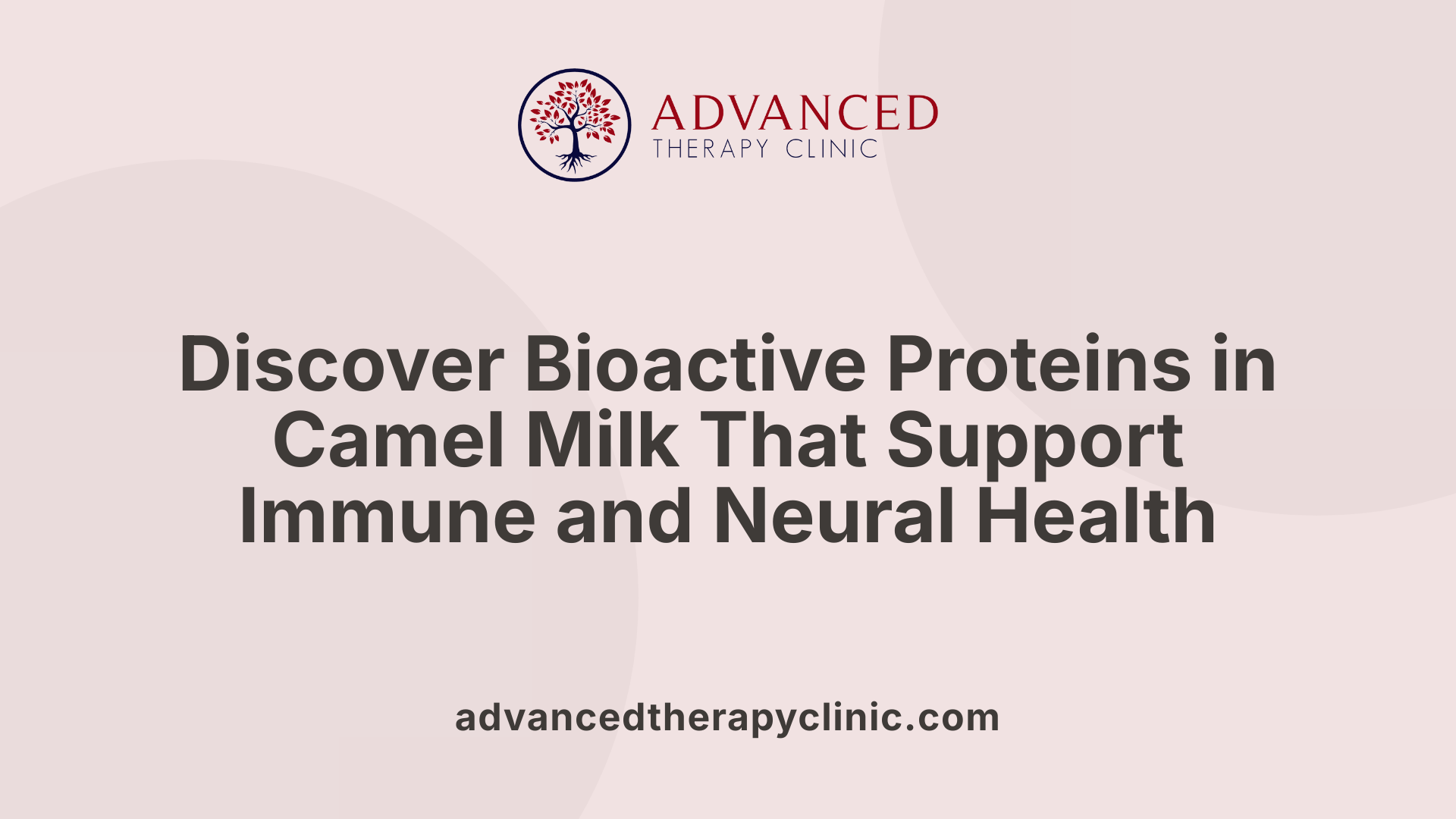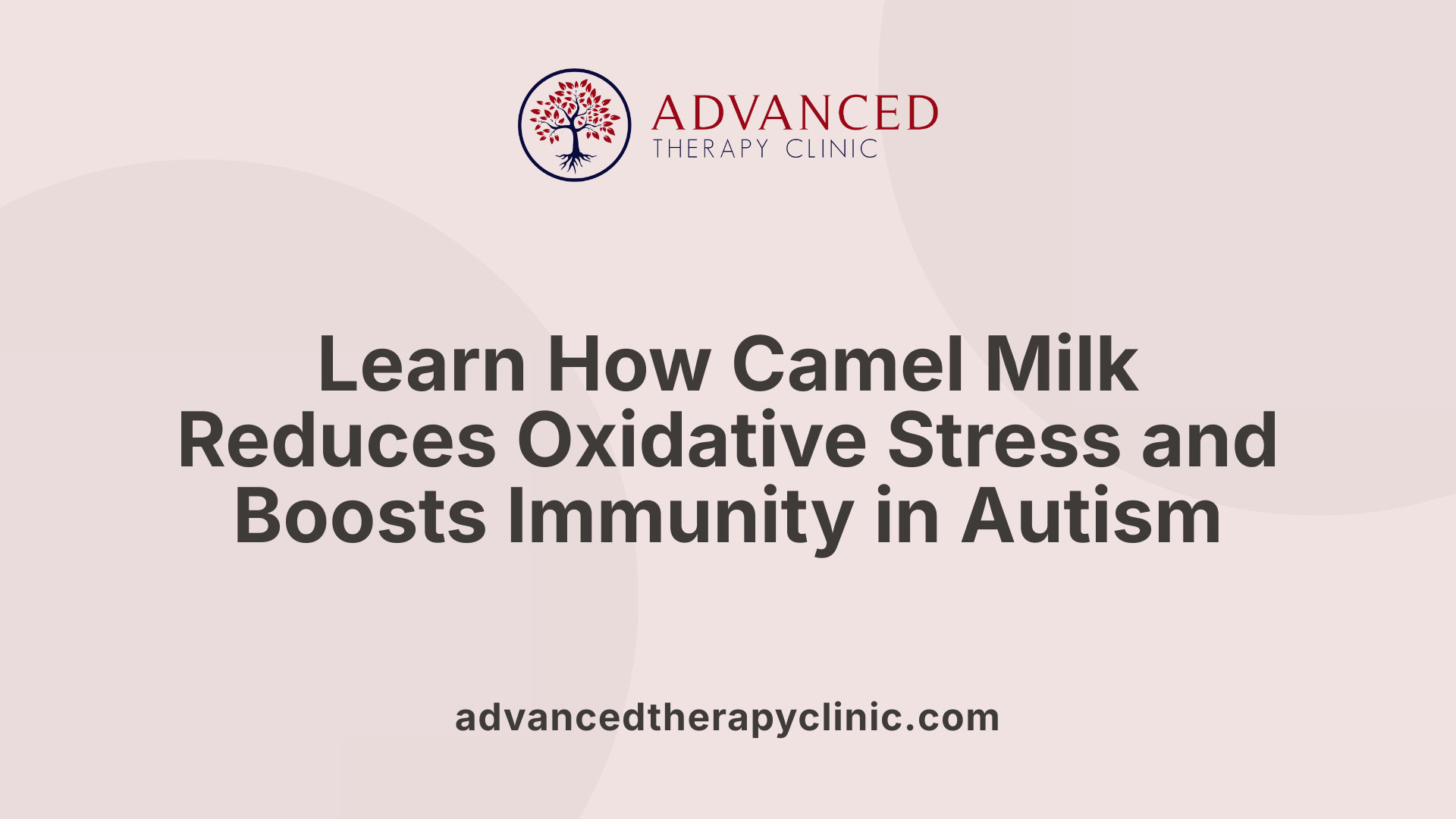Camel Milk For Autism


A Natural Approach to Supporting Autism Spectrum Disorder
Recent interest in alternative and nutritional therapies for autism spectrum disorder (ASD) has brought camel milk into focus. Known for its rich nutritional profile and unique bioactive compounds, camel milk is being investigated for its potential to improve behavioral and biochemical markers in children with autism. Although current evidence remains preliminary, numerous studies suggest it may support immune function, reduce oxidative stress, and enhance overall well-being for some individuals on the spectrum.
Nutritional Composition and Its Relevance to Autism
 Camel milk is packed with nutrients like vitamins C and B, calcium, iron, and potassium, which are essential for overall health. These nutrients support bodily functions such as immune response, nerve signaling, and bone health.
Camel milk is packed with nutrients like vitamins C and B, calcium, iron, and potassium, which are essential for overall health. These nutrients support bodily functions such as immune response, nerve signaling, and bone health.
Beyond basic nutrition, camel milk contains bioactive compounds including immunoglobulins, lactoferrin, and peptides. These substances have been shown to exert anti-inflammatory and immunomodulatory effects. They may help regulate immune responses and reduce neuroinflammation—factors that are often associated with autism spectrum disorder (ASD).
Research has indicated that the immune-boosting properties of camel milk could contribute to improved behavior and biochemistry in children with autism. For instance, immunoglobulins and lactoferrin are known for their ability to fight harmful organisms and support immune health.
Moreover, these bioactive compounds can help decrease oxidative stress, a common issue in children with autism. The combination of nutrients and bioactive substances in camel milk may support gut health and neural function, potentially leading to behavioral improvements.
While these findings are promising, further research is necessary to fully understand how camel milk’s nutritional profile impacts autism symptoms. Current studies suggest that its rich nutrient and bioactive content could make it a beneficial nutritional therapy for some children with ASD.
Bioactive Proteins and Their Potential Benefits
 Camel milk contains a variety of bioactive proteins, most notably immunoglobulins and lactoferrin. Immunoglobulins are antibodies that play a crucial role in supporting immune defense, helping to identify and neutralize harmful bacteria and viruses. Lactoferrin, on the other hand, is a multifunctional protein with antimicrobial properties that can inhibit the growth of pathogens, bolster immune responses, and reduce inflammation.
Camel milk contains a variety of bioactive proteins, most notably immunoglobulins and lactoferrin. Immunoglobulins are antibodies that play a crucial role in supporting immune defense, helping to identify and neutralize harmful bacteria and viruses. Lactoferrin, on the other hand, is a multifunctional protein with antimicrobial properties that can inhibit the growth of pathogens, bolster immune responses, and reduce inflammation.
These proteins contribute to the antibacterial and antiviral effects attributed to camel milk. They can strengthen the body's natural defenses, potentially reducing susceptibility to infections. Research also suggests that these immune-boosting properties may help fight harmful organisms in the gut, which is especially relevant considering the gut-brain connection often discussed in autism spectrum disorder (ASD).
There is increasing interest in camel milk’s role in reducing neuroinflammation—a common feature in neurodegenerative and neurodevelopmental conditions like ASD. By modulating immune responses and decreasing oxidative stress, camel milk may help alleviate some neurological symptoms associated with these disorders.
Analysis of recent studies shows promising signs. For example, some research has observed that children with autism who consume camel milk experience improvements in immune markers, such as a reduction in serum TARC levels, and behavioral symptoms. While these findings are encouraging, more extensive research is necessary to establish definitive therapeutic effects.
Below is a summary of topics covered:
| Aspect | Details | Additional notes |
|---|---|---|
| Immune Proteins | Immunoglobulins and lactoferrin present | Support immune health, fight pathogens |
| Antibacterial and Antiviral | Proteins may kill bacteria and viruses | Potential to reduce infection risks |
| Neuroinflammation | Role in reducing brain inflammation | May help in neurodegenerative and neurodevelopmental disorders |
Though evidence is still emerging, camel milk’s unique protein profile offers potential health benefits, particularly in immune support and neuroinflammatory modulation. Continued research will shed more light on how these bioactive components could assist individuals, especially children with autism, in managing symptoms and improving overall well-being.
Impact of Camel Milk on Oxidative Stress and Immune Markers
 Research indicates that camel milk may positively influence markers related to oxidative stress and immune function, especially in children with autism spectrum disorder (ASD). Studies have shown that regular consumption of camel milk can lead to an increase in antioxidant enzymes such as glutathione (GSH) and superoxide dismutase (SOD). These enzymes play crucial roles in neutralizing harmful reactive oxygen species in the body, thereby reducing oxidative stress.
Research indicates that camel milk may positively influence markers related to oxidative stress and immune function, especially in children with autism spectrum disorder (ASD). Studies have shown that regular consumption of camel milk can lead to an increase in antioxidant enzymes such as glutathione (GSH) and superoxide dismutase (SOD). These enzymes play crucial roles in neutralizing harmful reactive oxygen species in the body, thereby reducing oxidative stress.
At the same time, camel milk appears to help decrease inflammatory markers. For example, serum levels of T-helper cell type 2 chemokine TARC often decrease following camel milk treatment in autistic children. This reduction suggests a dampening of inflammatory processes that are typically heightened in individuals with ASD.
Biochemical and clinical outcomes have been documented through various studies. These include improvements in behavioral symptoms—such as reduced severity of autism—along with changes in immune system markers. Notably, some research shows decreased serum TARC levels and enhancements in immune regulation, indicating potential immune modulation.
| Aspect | Observations | Additional Details |
|---|---|---|
| Antioxidant enzymes | Increased levels of GSH and SOD | Help combat oxidative stress common in autism |
| Inflammatory markers | Decreased serum TARC levels | Associated with reduced inflammation |
| Clinical outcomes | Improvement in behavioral symptoms | Such as social interaction and communication |
While these findings are promising, current scientific evidence still calls for further research. Larger, well-designed studies are needed to confirm camel milk’s efficacy as a supportive therapy for autism, especially concerning its effects on oxidative stress and immune function.
What scientific research exists on the impact of camel milk on autism? Research indicates that camel milk's antioxidant, anti-inflammatory, and immune-modulating properties can lead to biochemical improvements and behavioral benefits. Some studies report increased levels of antioxidants and reduced inflammation following camel milk intake, with associated improvements in autism severity. Despite these promising signs, definitive conclusions await more comprehensive, large-scale trials.
Scientific Studies and Evidence Base

What scientific research exists on the impact of camel milk on autism?
Research investigating the effects of camel milk on autism spectrum disorder (ASD) suggests potential benefits, primarily due to its antioxidant, anti-inflammatory, and immune-boosting properties. Several small-scale studies have documented behavioral improvements in children with autism after consuming camel milk. For instance, some children have shown reductions in scores on the Childhood Autism Rating Scale (CARS), indicating less severe symptoms.
Biochemical analyses provide additional insights. Studies have found that drinking camel milk can increase levels of antioxidants such as glutathione (GSH) and superoxide dismutase (SOD). These antioxidants help combat oxidative stress, which is often elevated in children with autism. A decrease in oxidative stress is thought to correlate with improvements in behavioral symptoms.
A notable meta-analysis published in 2024 reviewed multiple randomized controlled trials (RCTs) on this topic. The review concluded that camel milk might improve social interaction, communication, and some biochemical markers associated with autism. It also reported decreases in immune markers like serum TARC, linked to inflammation in autistic children.
Despite these promising findings, the overall scientific evidence remains limited. Most studies are small, often without control groups, and vary in milk processing and dosage. Therefore, while initial results are encouraging, larger, more rigorous clinical trials are needed to confirm the therapeutic potential of camel milk for autism.
In summary, current research suggests that camel milk could be a supportive nutritional intervention, helping to reduce oxidative stress and possibly improving some behavioral and immune-related symptoms in children with autism. Ongoing studies and future research are crucial to fully understand these effects and establish clear clinical guidelines.
Potential Therapeutic Role and Future Perspectives
What are the limitations of current research on camel milk and autism?
Current studies on camel milk's effects on autism are generally small and preliminary. Many have limited sample sizes, short durations, and lack control groups, which makes drawing definitive conclusions challenging. The variability in study designs and outcomes also contributes to the difficulty in assessing its true effectiveness.
Why is there a need for larger randomized studies?
To establish the therapeutic promise of camel milk confidently, larger randomized controlled trials (RCTs) are essential. These studies can provide more reliable data, reduce bias, and accurately measure the impact of camel milk on various aspects of autism, such as social behavior, communication, and biochemical markers. Only with such rigorous research can health professionals recommend camel milk as a standard intervention.
Can camel milk be used as a complementary therapy?
Camel milk's unique nutritional profile, containing vitamins, minerals, immunoglobulins, and lactoferrin, suggests it may be a useful complementary approach to traditional therapies. It has shown potential in lowering oxidative stress and modulating immune responses in autistic children. However, it should not replace conventional treatments, but rather be used alongside them while more evidence accumulates.
| Aspect | Current Evidence | Future Needs | Additional Notes |
|---|---|---|---|
| Autism Behavior | Some improvements reported | Larger studies needed | Not yet conclusive |
| Immune Response | Changes observed | Confirmatory trials | Promising but preliminary |
| Oxidative Stress | Decreases noted | More detailed biochemical analysis | Potential pathway for therapy |
| Safety and Tolerance | Generally well tolerated | Long-term safety data needed | Suitable for lactose intolerant and allergic individuals |
Summing up research findings on camel milk and autism?
Recent research suggests potential benefits of camel milk in improving autistic behaviors and reducing inflammation and oxidative stress. Some studies report increased antioxidant enzymes and decreased inflammatory markers after camel milk intake. Parents and clinicians have noted behavioral improvements, including better communication and calmer behavior.
However, systematic reviews, including a 2024 meta-analysis, highlight that evidence remains limited due to small sample sizes and study design flaws. These promising early results warrant further high-quality research to verify effectiveness and understand mechanisms. Overall, camel milk holds promise as a nutritional therapy component, but confirmation awaits larger clinical trials.
The Future of Camel Milk in Autism Management
While initial findings and anecdotal reports are promising, the scientific community emphasizes the need for more comprehensive research to definitively establish camel milk's therapeutic efficacy for autism spectrum disorder. Its rich nutritional profile and bioactive components hold potential, particularly for immune modulation and oxidative stress reduction. As research advances, camel milk could become a valuable complementary approach, offering a natural option for supporting behavioral and biochemical aspects of autism. Until then, it should be approached cautiously and as part of a broader, supervised treatment plan.
References
- 6 Surprising Benefits of Camel Milk (And 3 Downsides)
- Behavioral Benefits of Camel Milk in Subjects with Autism ...
- Camel Milk as a Potential Nutritional Therapy in Autism
- Exploring the therapeutic and nutritional potential of camel ...
- Camel Milk as a Potential Therapy as an Antioxidant in ...
- Camel Milk for Autism: What Are the Benefits?
- Meta-analysis of the efficacy of camel milk consumption for ...
- Research findings on using camel's milk for autism
- Camel Milk as a Potential Therapy as an Antioxidant in ...
- Meta-analysis of the efficacy of camel milk consumption for ...
Recent articles

Celebrating Small Wins: How Therapy Helps Kids Build Confidence All Year Long
Learn why small wins in therapy matter, how they boost your child’s confidence, and simple ways families can celebrate progress all year long.

Empowering Missoula Children to Grow With Confidence and Connection
Learn how ABA therapy in Missoula helps children build communication, independence, and confidence through personalized, family‑centered support at Advanced Therapy Clinic.

Compassionate Pediatric Therapy in Butte, Montana
A welcoming place where every child’s potential is celebrated

How Pediatric Therapy Helps Kids Thrive across Montana and Wyoming
A supportive guide for families exploring therapy options in Billings, Butte, Missoula or Sheridan.

How to Choose the Right Pediatric Therapy Clinic in Billings, Montana
A Parent‑Friendly Guide To Finding The Best Support For Your Child

Expressive Speech Delay 2-Year-Old
Understanding and Addressing Expressive Speech Delay in Toddlers

